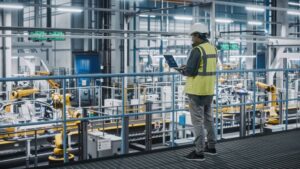Increased inflation rates have been widespread throughout the United States and other developed economies, causing many industries to feel the strain of its effects. This includes the construction industry, which has seen the effects of Inflation through increases in the cost of materials, machinery, fuel, and labor.
Price increases across the industry can negatively impact the profitability of construction projects. In fact, the uncertainty surrounding future expenses in the industry has made it challenging for companies to keep up with their competition.
While it’s difficult to say how this inflationary period will continue to impact the construction industry in the future, we can at least speak for the challenges workers and other construction personnel face now.
Increases in the Cost of Required Construction Materials
One way inflation has impacted the construction industry is by increasing the price of construction materials–especially raw materials–thereby shooting up the overall cost of construction projects and bids.
The cost of construction materials can take up 35 percent to 60 percent of the overall cost of a construction project, which is a considerable portion of the budget. So, when inflation causes the price of these materials to increase, these projects can quickly come in over budget.
A rise in the cost of construction materials is one of the main factors that contribute to cost overruns, or when the actual cost of a project exceeds the budget. Cost overruns can quickly delay projects, reduce profitability, increase the risk of project failure, and make it difficult for the construction management team to adjust its plans.
Additionally, raw materials such as steel, lumber, and concrete increase in price significantly during periods of inflation. As the production and transportation costs of raw materials goes up, suppliers pass on these additional costs to construction companies who order from them. This results in construction companies paying higher prices for construction materials and risking cost overrun.
Increases in the Price of Machinery and Fuel
The cost of other construction project needs, such as machinery and fuel, have also risen due to inflation. Rising fuel prices, in particular, have been putting extra strain on contractors’ budgets because of how many pieces of essential equipment are required for a construction project.
For example, bulldozers, cranes, and backhoes are all pieces of heavy machinery that run on fuel and are a necessity in the construction industry. As fuel prices increase, construction companies will likely have to pay more to rent this machinery, thereby spending more money to transport supplies and equipment, as well as to complete a project on time.
Furthermore, companies that manufacture construction machinery also raise their prices during inflationary periods. This is because the cost of raw materials goes up, forcing manufacturing delays that can’t keep up with the demand for the product.

Increases in the Cost of Skilled Labor
During an inflationary period, skilled labor becomes increasingly expensive. Many employers in the construction industry must adjust compensation levels based on cost-of-living trends. As cost-of-living increases, so do employee salaries.
Paying employees more comes with a price, as it increases the overall cost of having skilled workers on your team. Additionally, not only must employers spend more to retain their current workforce, but they also must fork over a certain amount of money to hire and train new staff. If construction companies are unable to keep up with the increased cost of having a workforce, the industry at large may experience a labor shortage.
Labor shortages have certainly affected the construction industry, especially during the COVID-19 pandemic. With wages making up a rather large fraction of the overall cost of a construction project, a higher cost of labor can have massive impacts on a project’s profitability.
There also tends to be a shortage of skilled workers in the construction industry during periods of high inflation. This means that the skilled personnel already working in the industry may seek a higher pay, as they are likely doing more work than what would be typically expected. Unfortunately, increasing worker compensation in the middle of a project can decrease overall profitability and increase the risk of cost overrun.
How to Find Construction Managers and Other Professionals
Recruiting professionals or executives in the construction industry can be a challenge, especially with the current skilled labor shortage. To find and hire the right candidates, it’s important to implement a strong recruiting strategy to keep up with current recruiting trends.
A few strategies recruiters can implement into their hiring process may include:
- Tapping Into Industry Networks: One of the best ways to find construction professionals is to tap into industry networks. Mutual professional connections in the construction field can help you find potential candidates and connect you with other professionals who may be interested in the position.
- Leveraging Social Media: Social media platforms like LinkedIn and Facebook can be effective tools for recruiting project managers, VPs, and other professional roles in the construction industry. Posting job openings on these social platforms helps you reach a wider audience, and you can easily reach out to potential candidates directly.
- Offering Training and Apprenticeships: Many construction professionals are looking for opportunities to improve their skills and advance their careers. Consider advertising your company’s training and apprenticeship program within a job posting to attract candidates who are looking for growth opportunities.
- Using Job Boards: Job boards like Indeed and Monster can be effective tools for recruiting those in the construction field. It’s important to post detailed job descriptions on these sites and use relevant keywords within the posting to attract the right candidates.
- Partnering with a Construction Recruiting Agency: Working one-on-one with a recruiting company that already knows the construction industry inside and out can be a huge asset for your hiring process. Oftentimes, these agencies have a plethora of resources for finding the right candidates who have the skills and experience you’re looking for.
By partnering with a construction recruiting agency like Austin Nichols, you can increase your chances of finding and hiring skilled construction workers for your open positions. To jumpstart your hiring process, contact us today!










